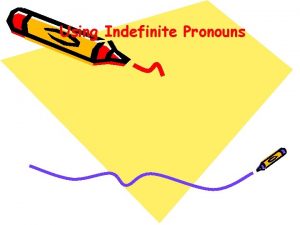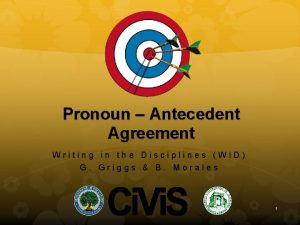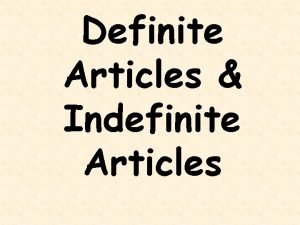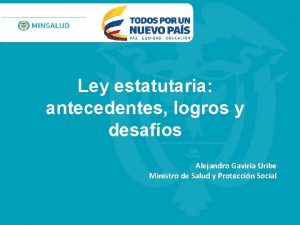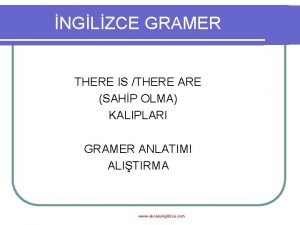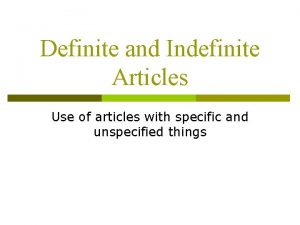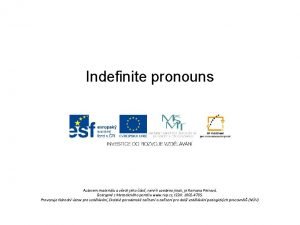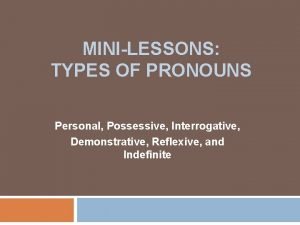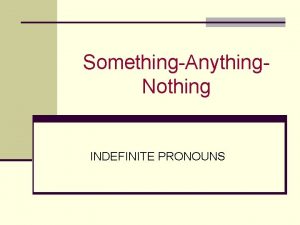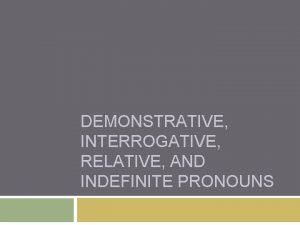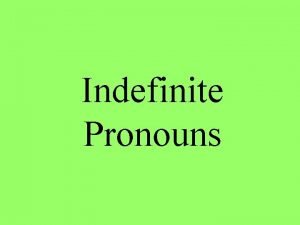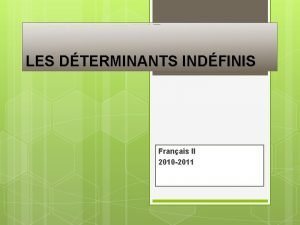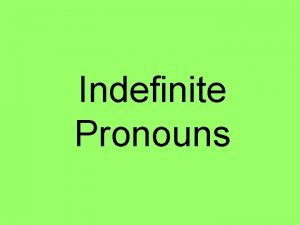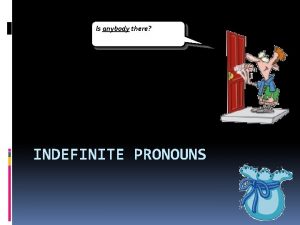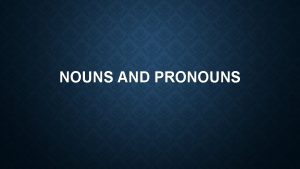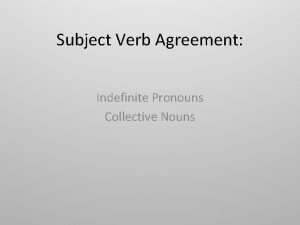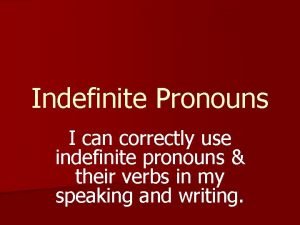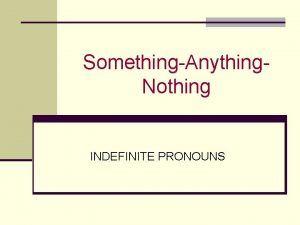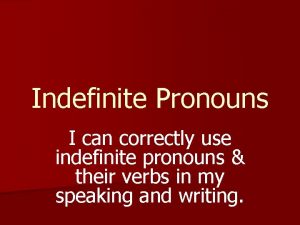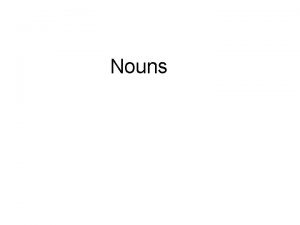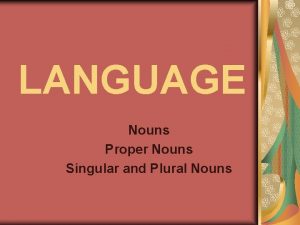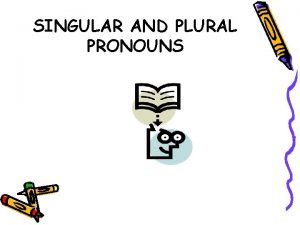Indefinite Pronouns Mr Gaviria SOMEANY plural nouns There




















- Slides: 20

Indefinite Pronouns Mr. Gaviria

SOME/ANY (plural nouns) There are some flowers Some Any There aren’t any cups Are there any books?

An indefinite pronoun: �Does not refer to a particular person, place, thing, or idea �It can be used alone or with nouns.

Examples: �Has any student read this Native American folktale? �Have any read “The Voice of the River”?

Always Singular another everybody anything everything anybody each other either everyone much neither nobody

Always Singular no one nothing one somebody someone something

Always Plural both few many others several

Change their number all any most none some

Why does singular or plural matter? �When you are using a present tense verb, you have to know whether to make it singular (use an –s) or plural (do not use –s).

How do you decide? �Look at the prepositional phrase after the indefinite pronoun. �If the object of the preposition is singular, use a singular verb. �If the object of the preposition is plural, use a plural verb.

Prepositional Examples of changing phrase �Some of the people are Prepositional familiar with this folktale. phrase Plural verb �Most of this tale takes place in Prepositional Africa. phrase Singular verb �Most of the characters are animals. Plural verb

Possessive Pronouns WITH Indefinites �Possessive pronouns often have indefinite pronouns as their antecedents. The two must agree in number.

Examples �Many are happy to share their folktales. (plural) �Each must be willing to wait his or her turn. (singular)

Try it! Choose the correct indefinite pronoun. �(Everyone, Many) likes to read an exciting myth. �(One, Others) from Greece is about a father and a son. �(Anyone, Few) were able to guess the myth’s ending.

Try it! Choose the correct indefinite pronoun. �(All, Anybody) enjoy the myth of Daedalus and Icarus. �(Both, One) of the mythical characters live on the island of Crete. �Daedalus has artistic talents: (none, nobody) denies that.

Try it! Choose the correct indefinite pronoun. �(Few, Somebody) match Daedalus’s skill in design. �(Some, Each) of these students model their work on his art. �(Each, Both) of the characters is interesting.

Try it! Choose the correct form the verb or possessive pronoun so that it matches its antecedent. �Although many may try, no one (escape, escapes) the king’s maze. �Everything (changes, change) when Daedalus tells the secret. �At last someone finds (his or her, their) way out.

Try it! Choose the correct form the verb or possessive pronoun so that it matches its antecedent. �Some of the readers (knows, know) the rest of the story; the king forbids Daedalus to leave. �Something (take, takes) shape in Daedalus’s skilled hands wax wings for himself and Icarus.

Try it! Choose the correct form the verb or possessive pronoun so that it matches its antecedent. �Both (plans, plan) an escape across the sea. �Each puts on (his, their) pair of waxy wings. �At first everything (goes, go) well for the pair. �Several (see, sees) them flying in the sky.

Try it! Choose the correct form the verb or possessive pronoun so that it matches its antecedent. �One (flies, fly) too close to the sun; the wax melts, and he plunges to his death. �Which one (lands, land) safely in Sicily? �When someone tries to do the impossible, disaster can strike (him or her, them).
 Indefinite adj
Indefinite adj Agreement with generic nouns and indefinite pronouns
Agreement with generic nouns and indefinite pronouns Singular and plural noun examples
Singular and plural noun examples Plural nouns y gender nouns
Plural nouns y gender nouns Nouns and articles spanish
Nouns and articles spanish Jorge mario gaviria
Jorge mario gaviria Valentina gaviria trans
Valentina gaviria trans Logros de alejandro gaviria
Logros de alejandro gaviria Countable and uncountable there is there are
Countable and uncountable there is there are Solid volume definite or indefinite
Solid volume definite or indefinite Definite indefinite
Definite indefinite Indefinite article with uncountable nouns
Indefinite article with uncountable nouns The definite articles in spanish
The definite articles in spanish Everybody somebody anybody and nobody
Everybody somebody anybody and nobody This that are pronouns
This that are pronouns Indefinite pronouns cartoon
Indefinite pronouns cartoon Relative interrogative pronouns
Relative interrogative pronouns Indefinte pronouns
Indefinte pronouns Indefinite pronous
Indefinite pronous Indefinite pronouns affirmative negative interrogative
Indefinite pronouns affirmative negative interrogative Indefinite pronouns
Indefinite pronouns
